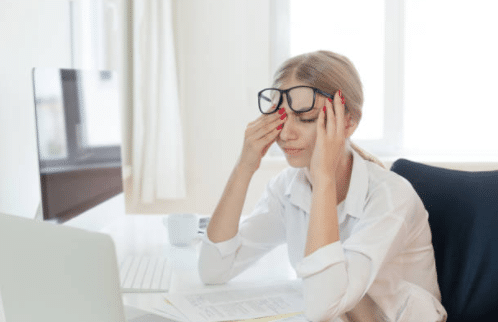
Why do my eyes feel tired?
Tired eyes or eye strain can be caused because of many reasons, and to anyone. It is generally prevalent and not that harmful, but in some cases, it can indicate an underlying eye condition that might require treatment. This condition is also called Asthenopia. Its symptoms may include:
~ Watery or tired eyes
~ soreness in eyes
~ tiredness in eyes
~ burning or itching in eyes
~ sore neck, shoulders, or back
~ difficulty in concentrating
~ difficulty in keeping eyes open
~ Dizziness
~ headache
~ blurred or double vision
This can be cured with primary care and are only temporary; thus, you should not have to worry about your vision suffering. This can be caused due to intense focus or constant use of eyes without rest. People having tired eyes have trouble focussing their vision and might feel pain in their eyes.
This can be remedied by only taking a break or work in well-lit areas. You can also do little massages or close your eyes for a while to give it rest. This will help in giving your eye muscles some time to relax. Sometimes doctors call it the computer vision syndrome or digital eye strain. The activities that may cause this are:
~ Reading without a break
~ Not taking a break in screen time
~ Driving long distances
~ Having and exposure yo bright light or glare
~ Seeing device or reading in a dim light
~ Having an uncorrected vision
~ Feeling Stressed
~ Experiencing Fatigue
Even though it is pretty common to experience eyestrain, there are ways in which we can prevent this:
~ Place your desktop/laptop 20-26 inches away from your eyes and try to place it a little below eye level. Clear their screens to avoid problems like smudges that might reduce contrast and result in glare and reflections. Also, put a glare filter for your screen.
~ Change your lighting to adjust to soft tones and remove harsh reflections. And try working with the 20-20-20 rule, which means to look at something that is 20 feet away for 20 seconds. Remind yourself to include breaks from any screen time you engage in, and remind yourself to blink.
Why do I see specks/dots/lines/circles/flashes/stars sometimes?
Seeing these things can mean two conditions called: flashes and floaters.
Flashes: They are sparks or strands of light that flicker across the visual field. It can slow look like lightning streaks or flashing lights in your vision. Some people term it as “seeing stars” after one has something hit on his head. It is a symptom of aging and begins when the vitreous rubs or pulls your retina. It is normal to see them for weeks or months even, with aging, it becomes common. Vitreous is the gel attached to the back of our eye. It becomes liquid and collapses away when we age. It is because of this you may see a flash in one or both the eyes. It doesn’t obscure your vision but is just present in the corner of your eyes. Although people with migraine anyway see shimmering or zig-zag lines. In rare cases, flashes indicate retinal detachment, which you should get yourself treated for as soon as you notice it.
Floaters: Floaters look like small dots, specks, circles, lines, or cobwebs in your vision. It may seem they are floating in front of your eye, but they are floating within. Floaters are the tiny clumps of gel or cells found inside the vitreous that fills your eye. The dots and other shapes you see are shadows these clumps cast on your retina. So if you have a feeling that you are watching this outside, it is found in the inside of your eye. Floaters move when our eye moves and appear to zoom away if we look directly towards them and drift slowly if we stop moving our eyes.
Floaters can be seen when looking at something plain like a blank wall or blue sky. It is due to the same reason flashes happen, i.e., aging. The vitreous at the back of our eye form clumps or strands. Floaters are not this serious as they go in a little time. If there is a condition where the floaters are severe where they are there instantly or are very many, they can be removed from surgery, but that may pose some risks and are not necessary.
People can get floaters if they face:
~ nearsightedness
~ had surgery for cataracts
~ inflammation in the inside of the eye
~ diabetes
Most people feel floaters are fine and don’t affect their vision; some claim that it hinders their vision and ability to read.
Symptoms of Flashes and Floaters:
The symptoms are not something to worry about usually as you get used to them, but it becomes a matter of concern if you face the symptoms listed below:
~ increase in floaters
~ if you continuously notice flashing but not have a migraine
~ a large floater, obscuring your vision
~ after a blow in the eye your face that causes a change in the floaters and flashes
~ cobweb shadow, slowly spreading across your eye
Any of the above symptoms are a direct indication of the severity. You should immediately contact your optometrist and get urgent attention or some eye casualty department if your optometrist isn’t available.
Treatment:
Though there is no requirement for treatment for normal floaters and flashes, if you feel you have floaters lasting more than usual and obscuring your vision, you should contact your optometrist. The same should be done in the case of flashes. Flashes might settle for some people a few months after treatment, but there is no treatment for short term floaters.



